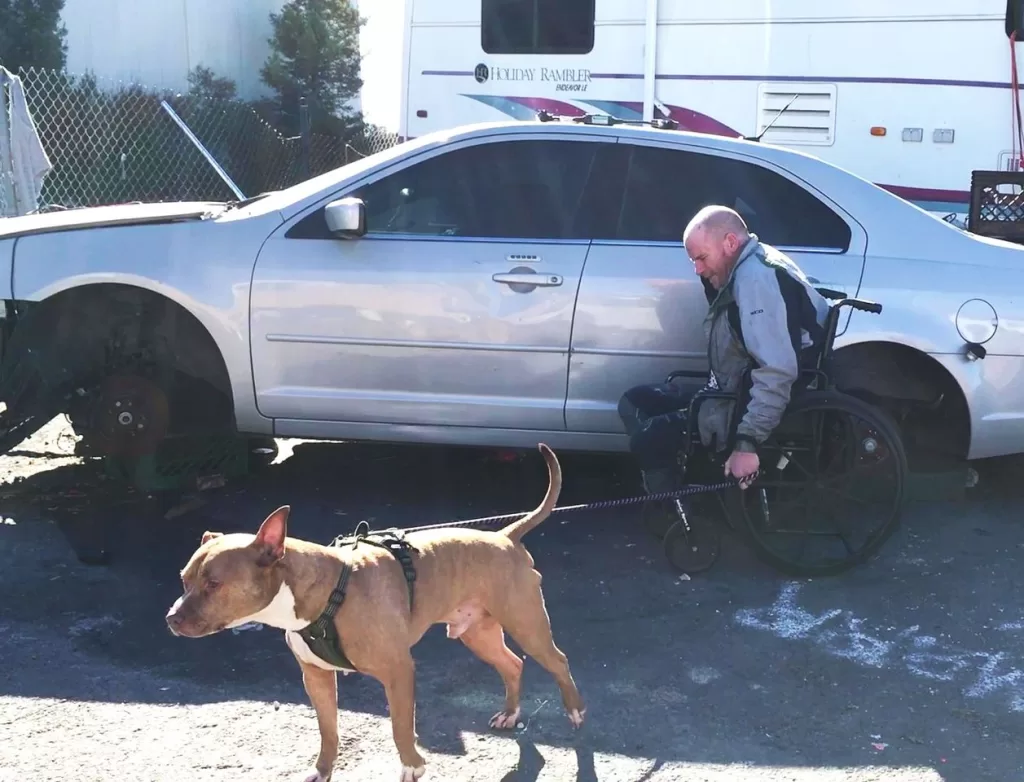
RICHMOND, CA. — Everyday life is a struggle for the residents of Camperland, the informal gathering of 35 households living in RVs, trailers and cars at Castro and Hensley in Richmond. The routine tasks of everyday life — hauling water, shopping for groceries, getting a shower, doing laundry, disposing of trash, charging a cell phone, heating your home, walking the dog — are daunting and time-consuming. These household chores are even more difficult for Justin Sindicich, 50, who has lived a medical nightmare for the last 10 years. In 2013, staph infection nearly destroyed his spine and led to five surgeries, months in the hospital, and a recovery that took years. This was followed by the amputation of his right foot in 2020, and his left foot a year later.
Justin’s medical troubles started with an extremely minor injury on the job: a small cut on his finger when the screw gun he was using jumped off the screw, an everyday occurrence for someone in his trade. Justin was a stage carpenter, a specialized and highly skilled profession. He built sets and scenery for hundreds of productions around the Bay Area and worked as a rigger for giant rock concerts.
“I loved my job,” Justin said. “My uncle was a stage carpenter and ever since I was 5 years old, I wanted to do what he did. Didn’t seem like work. I got paid to go build stuff and hang out with my friends. I was lucky. Not too many people can say they had a job they’d wanted to do since kindergarten and made a decent living at it. I felt good every day.”
While recovering from the staph infection and spinal surgeries, Justin didn’t know that he was developing a serious case of diabetes which frequently leads to circulation problems in the legs and feet and weakens the body’s ability to fight off infection. When his feet started hurting around 2018, he didn’t worry too much. But a slight infection in his left foot quickly led to complete amputation in 2021, and a few months later he lost his right foot as well. He would never work as a stage carpenter again.
He borrowed money to stay afloat during his convalescence from the spinal surgery but had to sell his home in Pinole to pay debts. In 2019, he started living in his RV.
No RV park would rent him space because his vehicle was considered “too old.” Cops chased him from on-street parking. Finally, a friend told him about Camperland. He drove in in 2019 and has been there ever since.
Justin uses a wheelchair and crutches, but the prosthetics he’s been given don’t fit properly and he hopes to have them adjusted. But at Camperland, Justin found a caring, supportive community. Neighbors reached out to help him do his grocery shopping, haul water, keep his generator running, ferry him to doctor visits, walk his dog, Humphrey. “There’s a lot of good people here looking out for me,” he said.
One neighbor, Brianni Peters, who recently moved out of a Camperland RV into a new apartment said, “Everybody pitched in to help him out when he needed something. But he’s a pretty strong dude, he can handle a lot himself in spite of his disability.”
Humphrey, a fawn colored pitbull with a sweet disposition, greets visitors to the RV enthusiastically, then politely goes off by himself to let the humans continue their conversation. Justin walks Humphrey twice a day, awkwardly dragging himself to the front door, and swinging down two steps into his wheelchair just outside the door. Then Humphrey takes over, pulling Justin and the wheelchair around the tiny open space in front of the RV and eventually taking care of his business.
Justin gets $1300 a month from SSI, barely enough to pay for necessities, and far below typical rent for an apartment. But he’s on waiting lists for housing and hopes to be moving soon. Ideally, he’d like to be in a shared house with some of the friends he’s made in Camperland. The ad hoc RV community is scheduled to be closed this year and the City of Richmond is providing funds for re-housing the residents.
Justin has moved through a gamut of emotions since the start of his medical ordeal. “I feel fortunate that things could be way worse,” he said. “Moving around has gotten easier with time. My upper body strength is phenomenal from what it used to be. At one point I was like ‘I don’t want to live with no feet. I’ll just let the disease take me.’ But I decided I was gonna move forward and make the best life I can possibly make for myself.”
